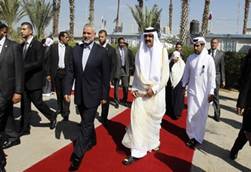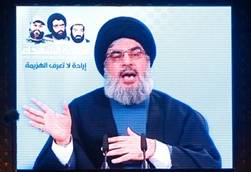 If it did anything, the landmark visit to Gaza by the Emir of Qatar Hamad bin Khalifa al-Thani on Tuesday exposed a slew of widespread regional fallacies.
If it did anything, the landmark visit to Gaza by the Emir of Qatar Hamad bin Khalifa al-Thani on Tuesday exposed a slew of widespread regional fallacies.
First looms the contention of Hamas Prime Minister Ismail Haniyeh that the visit ended the political and economic blockade of Gaza. This is vitally important, coming as it does days after another ship hired by radical leftists, the Estelle, attempted to sail from Europe to Gaza to break the blockade that, as Haniyeh himself attests, does not exist.
Hamas and its global coterie of cheerleaders cannot have it both ways. There either is a blockade or there is not. Truth cannot be adjusted to whatever they find convenient at any particular juncture. Continue reading








